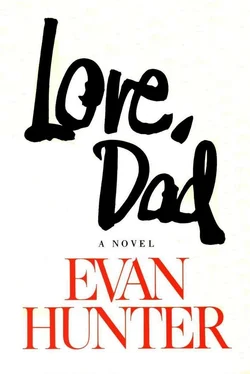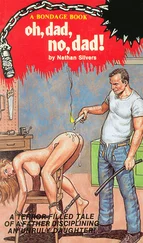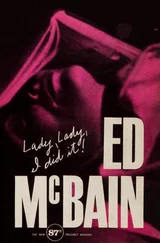P.S.S. Scads and scads of hugs, too. I love you both. I love you.
Hugs and kisses. Love. Bye for now.
The road outside Teheran angles sharply northward at Asalak where they catch a ride in another truck, this one carrying fertilizer from a plant in Germany. The driver speaks only German. Hunched over the wheel, he carefully watches the asphalt ribbon that winds through the pass to Babol and the sea. They drive eastward along the Caspian for the better part of the day, coming at last to the town of Gorgãn, where the driver indicates to them in sign language that he will be spending the night here. It is only late afternoon, but a look at their map tells them that the nearest town of any size is Meshed, which they estimate to be some five hundred kilometers away — at least a ten-hour journey over twisting mountain roads. They eat mutton and boiled rice in a roadside teahouse, and then rent a small room there for the night. The room costs them twenty cents, and is furnished with a straw mat and a small silk prayer rug that would cost $600 back in the States. As Paul rolls over toward her, Lissie — for the first time in her life — claims she has a headache.
In the morning, and quite by chance since they had made no previous arrangement with him, they are picked up by the same German driver who seems happy to see them again, and who chatters on in German as though they understand him completely. They are in the mountains now, and traveling eastward along the Russian border, never more than seventy kilometers from it, and at one point — near Shirvan — less than fifty, the equivalent of thirty miles.
The road is tortuous and difficult. The German driver stops talking and concentrates on steering. They do not reach the bustling city of Meshed until long after dark. The German driver says his farewells, and they begin hitching again at once, catching first a small Iranian van carrying a mysterious cargo that rattles and clanks in the back, and then a larger truck en route from Istanbul and driven by a man who speaks only Greek. At midnight, they pass through the Iranian town of Taybad, cross the border without incident, and come into Islam Qala on the Afghan side. It is 12:20 on the morning of August 12. They are at this moment eighteen hours away from their rendezvous with the dogs of Shahnur.
Where earlier the truck route ran through the Elburz Mountains hugging the Caspian Sea and the Russian border, here in Afghanistan it avoids the loftier impassable peaks of the Hindu Kush range, and swings far to the south to enter the pass at Herat. Their Greek driver is following the route traveled by Alexander the Great in the fourth century B.C.; he will emerge from the pass at Qala Adras, and then continue on south in a wide loop that will take them to Kandahar and then through Jaldak and Shahnur (where they will meet the wild dogs) and finally through Ghazni and Kabul and eastward through the Khyber Pass into Pakistan.
The roads are narrow; the posted speed limit is fifty kilometers, and everywhere the headlights pick out the small triangular, red-bordered signs that stand in warning on the rock-strewn edge of the road: S-curve ahead. And ahead. And ahead. And ahead. The mountain range lies upon the land like a giant twisted paw, its curved talons digging into the sandy wastes to the southwest. Lulled by the motion of the truck, Lissie dozes most of the night and awakens sometime after dawn to discover a sandswept vastness on her right, just outside the open window.
The deserts in this part of the world are linked by a topography that respects no artificially created geographical borders. On Lissie’s map, the Dasht-i-Margo here in Afghanistan seems only an extension of the Dasht-i-Lut in Iran. As she squints her eyes against the eastern sun into which the truck is driving head-on, she spots upon the horizon a band of nomads riding mules, not camels, and herding before them a dozen or more beasts that look like long-horned cattle. The men are wearing turbans and smocks over baggy pants and sandals, all a dusty white, men and animals blending with the furrowed, windblown sand behind them. The small caravan shimmers like a mirage in the morning sun, and then is gone as the truck rounds a hilly curve. The shade is merciful but brief, the shadow of the hill embracing the truck for only an instant before it emerges again into full sunlight. There is only the desert now — and the unblinking sky.
The Greek driver stinks of garlic. He is prone to farting as well, and his effusive, effluvial stenches — combined with the heat and the desert dust that assail the open windows — are making Lissie a trifle ill. Ahead, she sees in the distance what appears to be a roadside bazaar, and as they approach it, another smell joins the pervasive mix in the cab of the truck: the unmistakable aroma of mutton cooking in oil. She has been sniffing this same scent halfway across Asia now. It is usually accompanied, as it is now, by the sweeter smell of rice frying with raisins and nuts, and this heady combination wafts back toward the truck now to comingle with the stench of the Greek’s flatus, the Greek’s halitosis, the stifling desert heat, the choking desert dust — she will vomit.
But the Greek slows the truck to avoid running down the jabbering crowd of people clustered about the jerry-built bazaar, and finally stops the vehicle altogether. Announcing in Greek, with appropriate, unmistakable, hand-to-mouth gestures, that he is going to have some breakfast, he climbs down from the truck, accompanied by the miasma of his body odors, trailing his various stenches behind him, wrapping them around him like the vaporous clinging veils on the women who crowd the meat vendor’s stand.
Lissie buys herself a piece of the ubiquitous thin bread (here in Afghanistan it is called nan) and a cup of hot green tea. Paul, sitting cross-legged beside the Greek driver, is eating mutton and rice. He complains the mutton is stringy. They leave the bazaar at seven-thirty that morning. The wind blowing in off the desert is hot and dry. Lissie tilts onto her face the straw hat she bought at the Covered Bazaar in Istanbul. She closes her eyes. She hears the Greek driver trying some English on Paul. He gives up after a few sentences. The desert is still again. She dozes.
Shahnur is only eleven hours away.
It must be close to noon when they approach Yakchal. Ahead, she can hear the muezzin calling as the truck slows down outside the village. She can see a dozen men touching their foreheads to the ground before a gray wall with an arched niche in it. Their feet are bare, their exposed soles dirty against the white humps of their massed backs bent in supplication to Mohammed. At a turn in the road a bit farther on, a group of silent barefooted children stand beside a peeling wooden gate in an ancient stone wall. One of the girls — Lissie guesses she is eleven or twelve — is wearing a beaded necklace around her throat; it reminds Lissie of a necklace Grandmother Harding gave her when she was nine. The driver shifts gears after rounding the curve, and the truck gains speed again. Lissie yawns. In a little while she is dozing again.
She does not catch the name of the next town; she awakens someplace in the center of it when the driver begins honking his horn. The cause of his impatience is a flock of sheep being led by a turbaned boy carrying a stick. The highway here has become a narrow dirt road pressed on either side by gray-walled buildings, and the sheep are crowding the road from curb to curb, leisurely bleating as the boy indolently flicks his stick at them and the Greek driver angrily honks his horn. Several men at the curb gesture for him to shut up.
The flock of sheep parts to let the truck through. The boy with the stick makes a gesture remarkably like that of throwing a finger back home — has he met many Americans? — and the truck eases through amid a cacophony of its own honking horn, the bleating sheep, and the shouting street merchants. Whatever the name of the town (she misses it again, craning for a look at the sign on their way out) they are through it and on the highway again by 2:00 P.M.
Читать дальше












